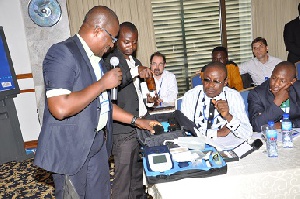Experts are attending a two-day regional workshop to evaluate mobile soil kits as part of efforts to promote agricultural enhancing technologies to boost productivity and ensure better returns on farmer investments.
The workshop on the theme: “Promoting Mobile Soil Test Kits for Rapid Fertiliser Decision-Making” is being attended by farmer-based organizations, soil fertility management specialists, extension agents, potential investors, input dealers and fertilizer stakeholders from 10 West African countries including Ghana, Togo, Benin, Mali, Chad, Senegal and Nigeria.
It is being hosted by the United States Agency for International Development West Africa Fertilizer Program (USAID WAFP), in collaboration with the Alliance for Green Revolution in Africa (AGRA), the Africa Fertilizer and Agribusiness Partnerships (AFAP), Envaserv Research Consult (ERC) and Columbia University.
Addressing the opening session, Dr Kofi Debrah, Chief of Party of West Africa Fertiliser Programme, said there is serious soil mining in sub-saharan Africa and that soil nutrient replenishment is recognized as critical to increase crop productivity and to close the yield gap.
He said in addition the practical identification of constraints and recommendations to improve crop production at the farmer level are limited.
West Africa has a huge agricultural potential with more than 233.9 million hectares of available arable land but only 68.2 million of these is in use and farming is also heavily dependent on rain fed agriculture.
Dr Debrah said the emergence of mobile soil testing kits could offer hope of providing tailored fertilizer recommendations for farmers.
He said, however, before the soil testing kits are promoted and recommended for widespread use, there is the need for further testing and calibration for the kits to produce credible results.
Besides, the soil test kits must be readily available and users adequately trained to interpret results as well as a conducive business environment for entrepreneurs to invest in the kits and provide services.
Dr Debrah expressed the hope that the meeting would come up with a road map on how test results from these kits could be used to guide fertilizer importers to supply the right type of fertilisers and also create opportunities for investments in simple fertilizer blending units and supply centres close to the farmers.
Dr Ekwe Dossa, a Soil Scientist, said soil testing would help propose corrective measures to nutrient and other soil conditions limitations.
He said mobile testing kits offer attractive option to small scale farmers in remote locations to test soils in areas with no functional laboratories.
He said traditional soil laboratories tend to be expensive and did not always provide accurate data to be used for fertilizer recommendation.
“A special interest is therefore being devoted to the use of mobile soil testing kits because of their simple nature which makes them user-friendly by farmers, extension workers and agro input dealers. This is relevant, especially if the soil testing kits would provide meaningful data about fertility and nutrient limitations of soils that would allow adequate fertilizer formulation,” he said.
The USAID West Africa Fertilizer Program (USAID WAFP) is a five-year USAID flagship project that seeks improved sustainable agricultural productivity through increased availability and use of fertilizer in West Africa.
Regional News of Wednesday, 1 April 2015
Source: GNA

















